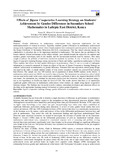| dc.contributor.author | Mbacho, Naomi W. | |
| dc.contributor.author | Changeiywo, J. M. | |
| dc.date.accessioned | 2022-09-02T13:55:03Z | |
| dc.date.available | 2022-09-02T13:55:03Z | |
| dc.date.issued | 2013 | |
| dc.identifier.citation | Journal of Education and Practice www.iiste.org ISSN 2222-1735 (Paper) ISSN 2222-288X (Online) Vol.4, No.16, 2013 | en_US |
| dc.identifier.issn | 2222-288X | |
| dc.identifier.uri | https://core.ac.uk/download/pdf/234634619.pdf | |
| dc.identifier.uri | http://hdl.handle.net/123456789/6125 | |
| dc.description.abstract | Students’ Gender differences in mathematics achievement have important implications for the underrepresentation of women in science. Typically, students’ gender differences in mathematics achievement emerge at the beginning of high school, where female students have continued to perform poorly in the subject in the Kenya Certificate of Secondary Education (K.C.S.E) examinations. That has raised concerns among the stakeholders in education due to the importance attached to mathematics. The factors that are attributed to the female students’ dismal performance in the subject include; poor attitude towards the subject by the students and teachers, gender stereotypes, lack of role models, and the instructional methods used by teachers. This study sought to address the problem of ineffective instruction methods by teachers. It was to find out if the use of Jigsaw Cooperative learning Strategy during instruction of Surds and further logarithm in mathematics to Form Three students had effects on their gender differences in performance. There is was as a result of inadequate information in research conducted in Kenya on effects of the use of Jigsaw Cooperative learning Strategy on students’ achievement in mathematics by gender difference. Solomon Four non-equivalent control group design was used in the study. A simple random sample of four district secondary schools was selected from Laikipia East District. The sample size was 160 students out of population of about 20,000 students in the district. A mathematics achievement test (MAT) was used for data collection. The instrument was piloted in a school which was not used in the study in the same district and a reliability coefficient of above the required threshold of 0.70 was found. The instrument was validated by education experts from the University. Data was analyzed using ttest to test hypotheses at Coefficient alpha (ά) level of 0.05. The results showed that there is no statistically significant gender difference in mathematics achievement when students are taught using Jigsaw cooperative learning strategy. The findings may be useful to policy makers, curriculum developers and education officers in deciding on the appropriate learning strategy for learners to reduce gender disparities. | en_US |
| dc.language.iso | en | en_US |
| dc.subject | Jigsaw cooperative learning strategy, gender differences in mathematics achievement in secondary schools | en_US |
| dc.title | Effects of Jigsaw Cooperative Learning Strategy on Students’ Achievement by Gender Differences in Secondary School Mathematics in Laikipia East District, Kenya | en_US |
| dc.type | Article | en_US |

